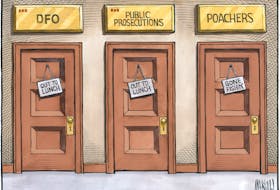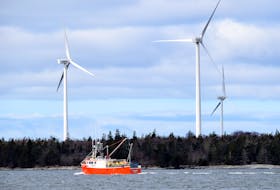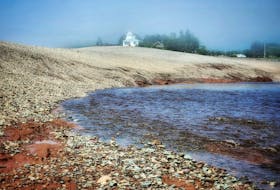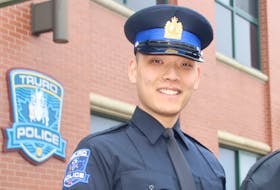
TRURO - Local veterans were all smiles upon receiving special recognition from the Russian government on Monday.
Truro's Jack Murphy, Riley Marshall and Archie Ross (posthumously) were presented with the Ushakov Medal for bravery for their Second World War efforts during the Murmansk Run. The run, which began in 1941, saw convoys around the world sail into the Arctic Ocean to deliver war materials to the Soviet Union. Canadian Merchant Navy and Royal Canadian Navy seamen joined the effort in 1943.
During the medal presentations on Monday at the Royal Canadian Legion in Truro in front of about 40 people, Murphy was all smiles.
"I feel great (about the award). It happened so long ago ... it was rough seas and it was cold," Murphy, 89, recalled.
Murphy said he looked after the restaurant on the HMCS Iroquois during the "six or eight months" he endured during the Murmansk Run.
"I thought we were recognized quite well," Murphy said of the award presentations because "(Russian president Vladimir) Putin himself recognized it."
Murphy said he went to school with Ross, who passed away a few years ago, and was thrilled to be honoured at the same time.
"He worked in the engine room" on the Stormont ship, said Murphy. "He was in the bottom of the ship and he always got sick."
Ross's aunt, Vivian Hoar, was touched her nephew was included in the recognition.
"I could cry all day I am so happy for him," said Hoar, 96, of Truro.
Hoar said although Ross "was a man of few words" she believes he would have been quick to voice his thanks.
Marshall, 90, said the recognition was appreciated.
"It's definitely very nice ... (I'm) surprised, really," said Marshall, who worked in naval communications during the Murmansk Run.
Marshall's daughter, Colleen Pinkney of Truro, attended the award ceremony. She was impressed the Russian Federation remembered the veterans, despite the passage of time.
"To see our father recognized means the world to us," Pinkney said as she and brother Peter congratulated their father. "I'm proud of the Russian government to do this."
Temur Tairov, a representative of The Russian Federation, who is based in Bedford, presented the awards. Tairov said 68 Canadians have been honoured with the medals, 11 of them from the Maritimes.
Tairov was emotional as he thought about the Canadian efforts and why it was so important for Russia to thank local veterans.
"Canadians contributed a lot. We were allies and we share in this together," said Tairov as a tear rolled down his cheek. "It's always important ... it doesn't matter the number of years that have passed."
Ron Trowsdale, first vice-president of the Nova Scotia Nunavut Command and a Truro legion member, said veterans of the Murmansk Run shouldn't be forgotten.
"It's not a campaign at the forefront (of people's minds) but it's very important and this is a unique opportunity that we cannot afford to let it pass," said Trowsdale.
INFO BOX:
Murmansk Run:
- In the summer of 1941, 41 Allied convoys sailed to the Soviet ports of Murmansk and Archangel during the Second World War. The Arctic convoys delivered millions of tons of supplies from the United States, Great Britain and Canada, including aircraft, tanks, jeeps, locomotives, flatcars, rifles and machine guns, ammunition, fuel and even boots.
- More than 20 per cent of all cargo on the Murmansk Run was lost and one convoy lost 24 of 33 ships at a cost of 153 lives.
- It was so dangerous that strict orders were given that no merchant ship was allowed to stop, even to rescue sailors who fell overboard.
- Many of the runs took place in the winter to take advantage of the almost constant darkness in the northern seas.
- The Merchant Navy Book of Remembrance in the Peace Tower on Parliament Hill records the names of the Canadians who died on the Murmansk Run, among the more than 1,600 Canadian Merchant Navy men and women who lost their lives during the Second World War.
* Information from www.veterans.gc.ca








